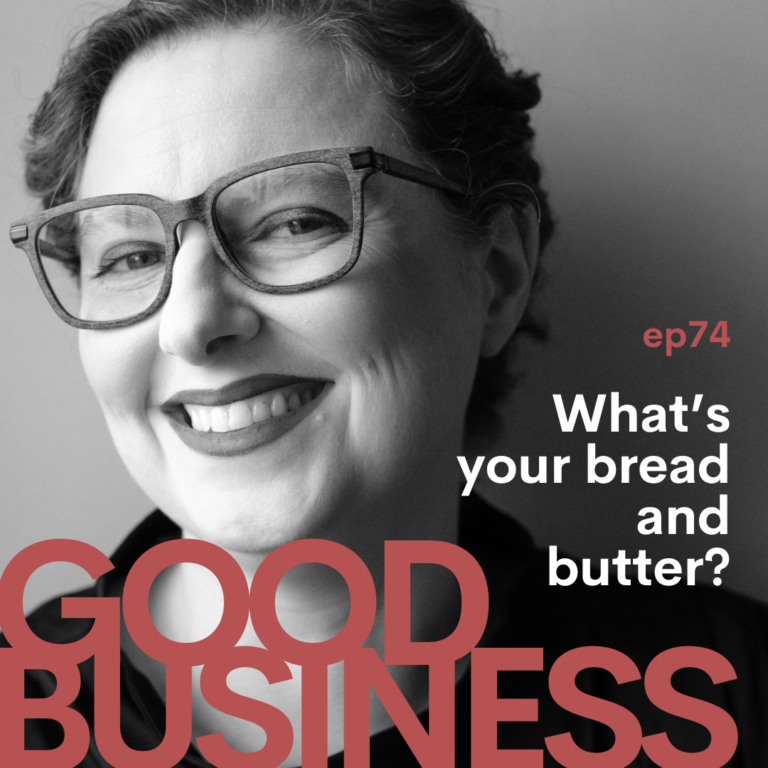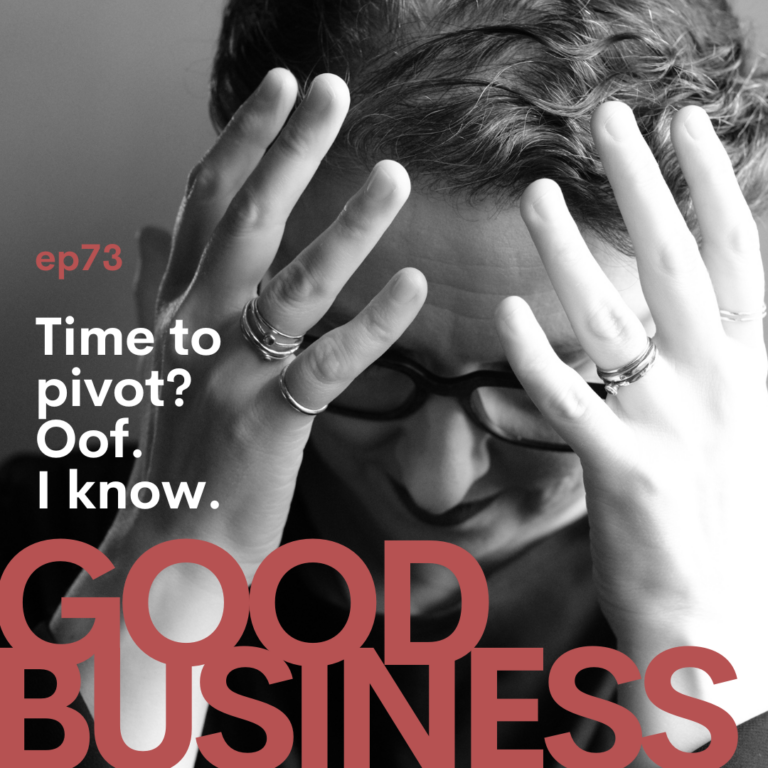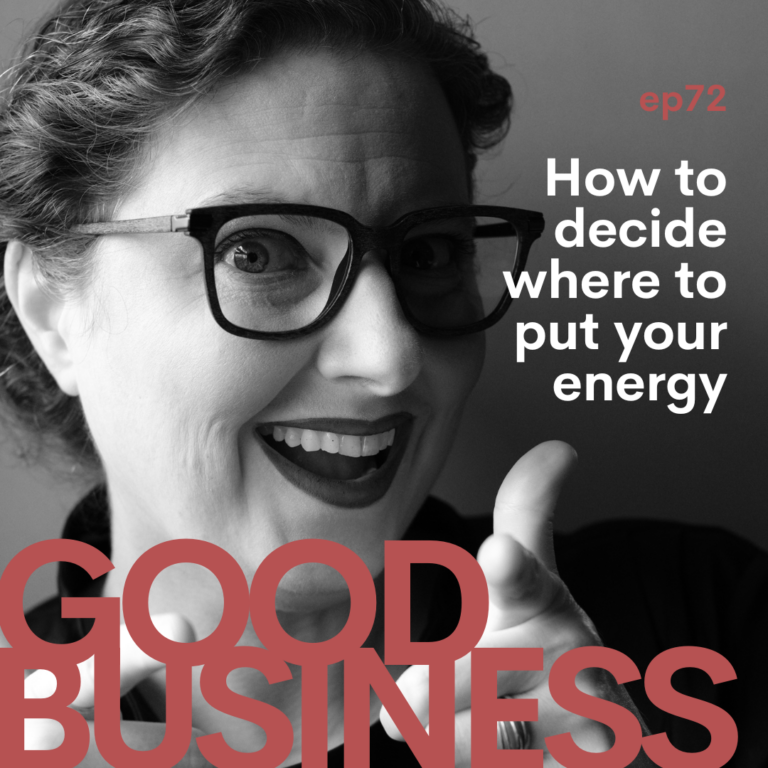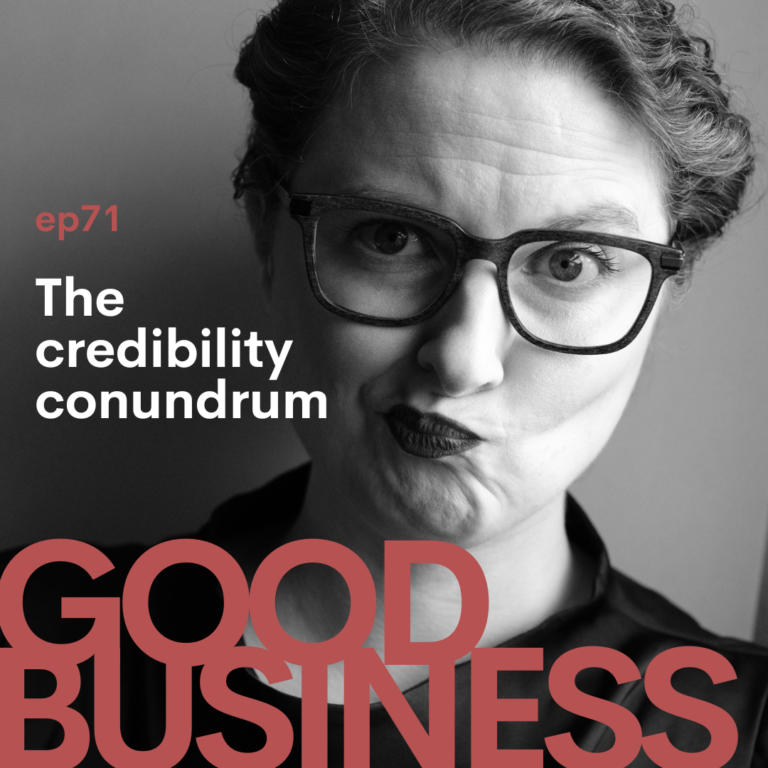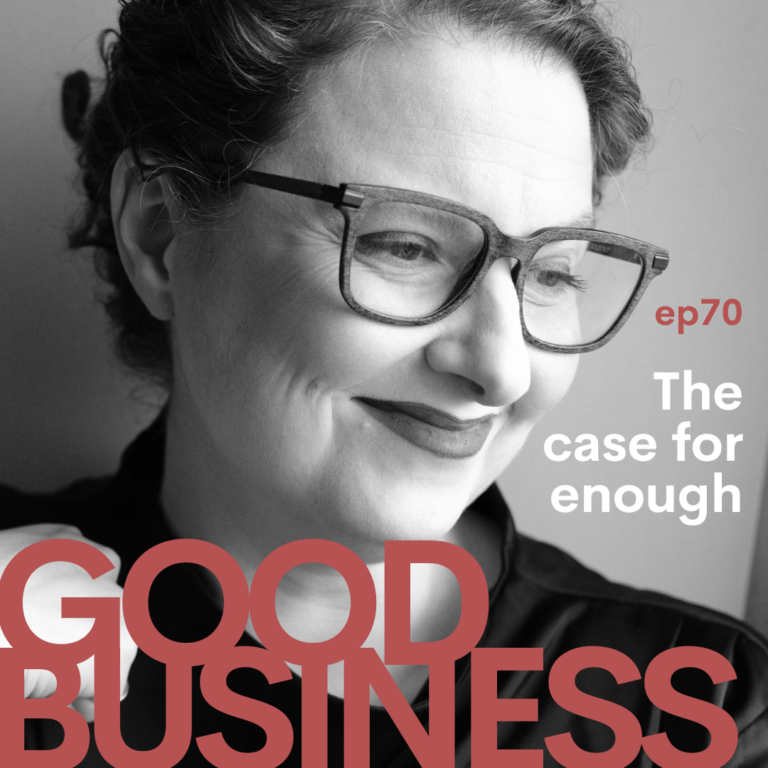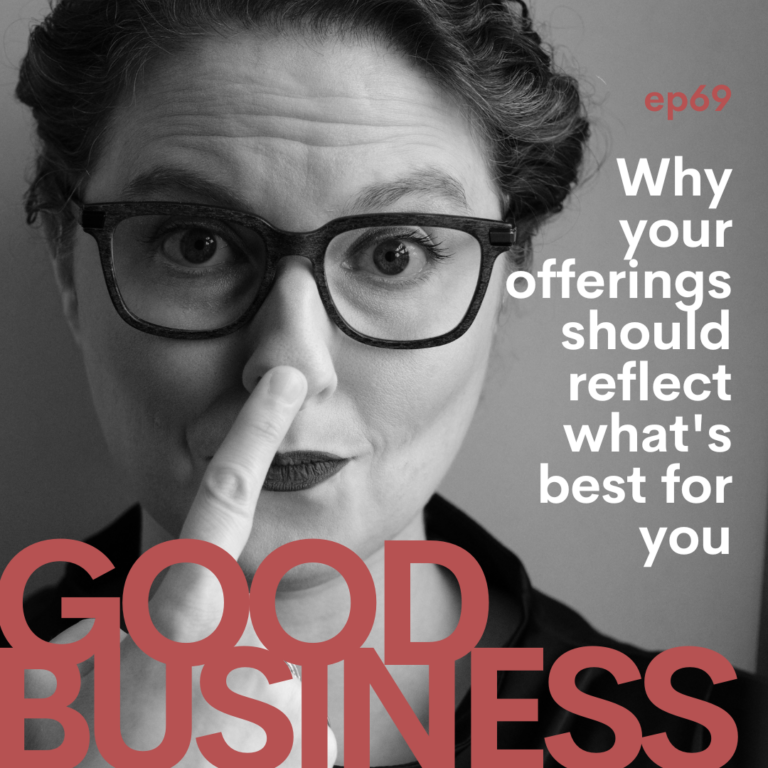Episode Transcript:
I’m Illana Burk, CEO of Your Life’s Workshop, coach to entrepreneurs and solopreneurs across dozens of industries and host of Good Business. With nearly 20 years experience helping hundreds of clients create profitable, ethically driven and sustainable businesses based on their life’s work, I’m here to teach you how to do great work, make great money, and make a positive impact without feeling like you need a shower afterwards.
Hi everybody. Welcome back. It’s been a little while, and thanks for hanging in with me. The global circumstances have made recording a podcast a little bit more complicated, so I’m really glad to be back, and I’m really glad to talk about all of this today. It’s been really difficult for me to wrap my head around it, as I am sure it is for many of you. I really appreciate your presence, and I’m going to jump right in.
Today’s episode is going to be a little bit different than most because, over the past several weeks, I’ve been trying hard how to best help my people. It’s why I haven’t published in a while. General lessons felt really elusive to me. I’ve struggled with it to be quite honest. For the first time in a really long time, I feel like I just kind of don’t have the answers that I want to have for my people, and I don’t have the critical thinking skills. I don’t know if it’s so much skills or if it’s just that, these are big things that we’re all grappling with, and I want to make sure that when I open my mouth, I have big things to say I guess. That feels like they can meet people where they are and have enough contemplation behind them that they’re a value to all of you. Right now, you know, nobody really has the answer. We’ve never really been here before. People who used to feel like they had it all figured out are now scrambling to figure out how to seem professional on Instagram and Zoom and Facebook and are trying to use all these platforms that they’ve never even touched before. People who thought that they were a mess are now looking like soothsayers because they know how to make cool things and sell them online. So down is up, up is down, everything is different, and none of us really have any fucking clue what the world’s going to look like five minutes from now, let alone six months from now. How do you teach strategy in those circumstances? How do you do what I do through that lens? How do you think about marketing when selling feels tone-deaf or insensitive?
The answer that I’ve come up with is simple. You don’t. Instead, you listen, at least first, and I’ll get to the selling part in a minute, but first, you listen. You create what people need most, and that’s what I’ve been working toward. You stand near them, and you ask them what they want. You ask them if they want what you’ve created. It’s why I created a quick resource guide to help my people that are in brick and mortar get online quickly. If you want that, you can find it on the Good Business Blog, by the way. It’s why I spent a couple of weeks doing that instead of recording podcasts and hustling.
I figured the best thing I could do is answer the questions that people have. All the while, I kept my eye on how I can help the most people without breaking myself in the process. I advise my people to do the same thing. That might mean that you don’t have much to give. And that’s all right. It might mean that the way that you help is simply keep showing up emotionally for just one person. Maybe that’s just one client or just your spouse or just a friend.
It might mean that what you offer can help thousands in a totally new way. You could be at the opposite end of the spectrum, where you have something that can make a difference for a lot more people. This could be an opportunity for you, which is hard to swallow in its own way, isn’t it? The only way that you can find out which, whether you’re more made to expand or contract under the current circumstances in a way that enriches your life and the lives of those you depend on for your livelihood, is that you have to put your community first without forgetting that you are a part of that community.
So yeah, you can sell, you need to sell, but you also need not be shortsighted, and you need not be dangerous. My God, I’ve seen some really like colossally dangerous choices that business owners have been making. Not just dangerous to their livelihoods, but dangerous to the actual health and wellbeing of the people they want to serve. You’ve got to remember that when the dust settles, the people you’re currently begging to buy gift cards or trying to sell your Instagram course to or trying to hustle with are going to be your customers again. Those are the people that are going to circle back around, and that’s if they survive.
I know that probably hit like a lead balloon in your ear right now. That’s the hard thing to say. My stomach flips over every time I say it. I rerecorded this section of this episode three times now. It’s really hard to say it without some sort of nervous laugh or uncomfortable tick. Because my God, when you confront the fact that people are truly dying – beyond all the problems we’ve experienced as a result of the pandemic and current circumstances – facing the fact that there’s real mortality involved is a piece of the conversation that’s simply not present unless you’re in the healthcare industry.
We’re all talking about how this affects us, and because the numbers are still low enough, not all of us have met someone or know someone or know someone who knows someone who has been directly affected by COVID. But we will. Six months from now, we will all know people who died from this, or at the very least, you’ll know people who are affected painfully and deeply by this. Those cheeky hashtags begging people to buy your stuff at a discount might not age so well. They might not feel so great six months from now. They might not make you look so great six months from now. To illuminate this a bit more, I want to tell you a couple of stories.
First, I live in the Pacific Northwest, and my very favorite coffee house is this incredibly beautiful space with light maple floors and big whitewashed walls and huge windows. The kind of place where you get a double espresso with the lavender tea cake in a $200 wax canvas tote bag. It’s that sort of place. In roughly the 24 hours before the state governor was issuing an order to close all the restaurants, this very same place was using the #WeBelongTogether and inviting the public to gather for live music. I kid you not. People were already staying at home. We knew what was happening, and they were inviting people down and saying we belong together. At that point, there was already death nearby. We live just two hours from Everett, where all this began here in the US, and I’m way too close for comfort. They were more concerned about their bottom line and this sort of brand ethos that they thought they were supposed to uphold than with the health of the very community they serve.
Twenty-four hours later, they were sending emails out after they closed after they shut down by governor mandate, and made it very clear in all of their marketing that it was not their choice. They were then begging their utterly ignored email list – seriously, I have been on their list for over a year, and I can’t recall ever getting anything from them – begging us all to buy discounted gift cards to help them stay in business. I remember the first thought I had when I read that was, “Why the fuck would I do that?” Why would I want to try and rescue a business that put their bottom line above the health and wellbeing of the very people they serve? It’s like it didn’t even occur to them to do something helpful. Like why not do a live stream of some of their performers on Instagram live? Why not donate coffee to a firehouse or a hospital or something useful? Do anything that might be of service to their people, something that shows leadership to their community, something that offers the people who have been buying their $4 cappuccinos, a reason to keep buying them when we recover from this. I was appalled. I was embarrassed. It was, um, you know, yeah. Not their finest hour. So.
The second story is in contrast. It’s another local business, and this one is a really big apple farm, the kind of place where they have hayrides in the fall and berry pies that would make Marie Callender take a seat. Their response to all of this was to immediately turn their distillery that they made hard cider towards making hand sanitizer. They designed this fabulous little logo for it on the fly and offered 20 ounces for free to anyone who wanted to stop by and fill up outside in the fresh air. They posted pictures of how you could maintain social distance and safety while getting hand sanitizer when it was completely out in all of the stores. Their promotions made it clear that it was safe, that they had our best interest at heart, that they were taking their harvest of apples and offering people an opportunity to get free apples if they needed produce and while hay rides might not be my thing and I don’t have a single rooster in my kitchen, you better believe that I will now drive out of my way this fall to buy apples from them.
And you know what? These two stories piss me off because that coffee house is my kind of place. It’s chic; it’s affected. It’s hipster heaven. These are my people. It’s organic; it’s overpriced, it’s quality-driven. The apple farm is the opposite. It’s conventional; it’s basic, it’s conservative. The mental image, when you think about making America great again, frankly. In any other circumstance, I would have said that my favorite coffee house was doing everything right in business, and the apple farm was a relic of a bygone era that I for one was happy had passed. Still, a global pandemic is not just any set of circumstances. It’s a moment where safety and collective security has to trump rhetoric or clever marketing or even business survival because, at the end of the day, there will be other coffee houses. Yours might not survive. It’s sad, but it’s true. Worrying about the short term could kill your chance of making it long term because business has never, under even the most ideal circumstance, been a sprint. It’s a marathon. Present discomfort is a frequent way of life for small business owners of all kinds, even when we aren’t in a global pandemic.
Risk is just a part of life for us. Unfortunately, way, way too many people start businesses not knowing this. So it feels like a shocking kick in the teeth when circumstances give way to chaos. Whether it’s a new highway that diverts traffic away from your hotel or a new player with deeper pockets who does what you do better and cheaper or a global pandemic, how you handle now will affect your ability or even opportunity to handle tomorrow. You have to choose wisely. You have to choose to listen, and you have to choose to help first.
With that in mind, I want anybody listening to know that if you need services that I offer, if you need help figuring out what this means to you, please reach out and contact me. I’m offering services on a sliding scale for as long as I possibly can and to as many people as I possibly can. If you help and you need help figuring out how to make your business work, please don’t hesitate to reach out. I’ve also started a free Facebook group called The Good Business Incubator on Facebook. It is a private invite-only group. So you need to send me a friend request on Facebook directly to Illana Burk. I’ll add you from there or just send me an email, and we can make it happen that way. It’s private; it’s secret, so you won’t be able to search for it. I’m keeping it very small because it’s a very, very helpful little community full of very experienced business owners and new ones alike. We’re all playing nicely together and helping each other, however we can. I invite you to be a part of that if it calls to you. I hope everyone is safe out there. I hope everyone is healthy. I hope everyone’s business survives, and I hope I can be a part of your success in the future. I hope you guys have a great day. Bye.
Thanks so much for hanging out with me today. For more information, visit www.thegood business.co or www.lifesworksdev.wpengine.com.
More Episodes
GB74: What’s your bread and butter?
Welcome back to Good Business. I’m your host, Illana Burk. Today, we’re talking about the most central parts of your work. The things that always feel true. The things that consistently make money. The things that people always...
GB73: Time to pivot? Oof. I know.
Welcome back to The Good Business Podcast. I’m your host, Illana Burk. Today, we’re talking about the very complicated moment when you realize that it’s time to make a significant change in your work. And these moments are never...
GB72: How to decide where to put your energy
Welcome back to Good Business. I’m your host, Illana Burk. Today, we’re talking about decision-making. Specifically, how do you decide where to put your energy around self-promotion when resources feel limited...
GB71: The credibility conundrum
Welcome back to the Good Business Podcast. I am your host, Illana Burk. And today, we're talking about credibility. What is it? Why do you need it? And how do you establish it in the age of the internet when you can...
GB70: The case for enough
Welcome back to the Good Business Podcast, everybody. I am your host, Illana Burk, and today we are talking about enough. So we begin with one word, and that word is more. That's what we're all supposed to want, right?...
GB69: Why your offerings should reflect what’s best for you
We’re diving into a topic that might just flip the script on how you think about your offers: “Why Your Offerings Should Reflect What’s Best for You Before They Reflect What’s Best for Your Clients.” Sounds counterintuitive. I know. Well, stick around because I’m gonna break it down in a way that’s both practical and super powerful.
First, I’m going to talk about what all this has to do with niching and marketing, then I’ll explain exactly how to do this, and finally I’ll dig into how this improves your leadership positioning.

